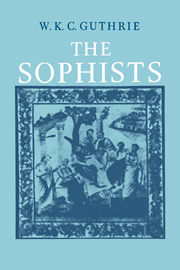Book contents
- Frontmatter
- Contents
- List of Abbreviations
- Preface
- I INTRODUCTION
- II TOPICS OF THE DAY
- III WHAT IS A SOPHIST?
- IV THE ‘NOMOS’ – ‘PHYSIS’ ANTITHESIS IN MORALS AND POLITICS
- V THE SOCIAL COMPACT
- VI EQUALITY
- VII THE RELATIVITY OF VALUES AND ITS EFFECTS ON ETHICAL THEORY
- VIII RHETORIC AND PHILOSOPHY (Seeming and being, believing and knowing, persuading and proving)
- IX RATIONALIST THEORIES OF RELIGION: AGNOSTICISM AND ATHEISM
- X CAN VIRTUE BE TAUGHT?
- XI THE MEN
- Bibliography
- Index of passages quoted or referred to
- General Index
- Index of selected Greek words
- Frontmatter
- Contents
- List of Abbreviations
- Preface
- I INTRODUCTION
- II TOPICS OF THE DAY
- III WHAT IS A SOPHIST?
- IV THE ‘NOMOS’ – ‘PHYSIS’ ANTITHESIS IN MORALS AND POLITICS
- V THE SOCIAL COMPACT
- VI EQUALITY
- VII THE RELATIVITY OF VALUES AND ITS EFFECTS ON ETHICAL THEORY
- VIII RHETORIC AND PHILOSOPHY (Seeming and being, believing and knowing, persuading and proving)
- IX RATIONALIST THEORIES OF RELIGION: AGNOSTICISM AND ATHEISM
- X CAN VIRTUE BE TAUGHT?
- XI THE MEN
- Bibliography
- Index of passages quoted or referred to
- General Index
- Index of selected Greek words
Summary
INTRODUCTION
In the foregoing chapters many of the views of Sophists and their contemporaries have been introduced in a discussion of the main topics of philosophical interest in the fifth century. The priority given to this discussion over a treatment of each thinker individually may be justified by the reflection that on the whole this was a debate of con- temporaries eagerly exchanging views and that the subjects of perennial human interest on which they argued do not admit of the same linear progress from one thinker to the next which can be detected in the more scientific theorizing of the Presocratics. It seemed best there-fore to reproduce, so far as possible, the interplay of their minds on this topic or that. There is the further consideration that, as I have tried to bring out more than once during the discussion, it is not always possible on the evidence available to assign a particular view to its author with certainty. Salomon went so far as to say (Sav. Stift. 1911, 131) that ‘the picture of the individual Sophists which we construct on the basis of such of their dicta as are preserved is, in so far as it is determined by the vicissitudes of the tradition, the result of pure chance.’ At the same time there is something in Nestle's reasons (in the preface to Vom Mythos zum Logos) for choosing an arrangement by persons rather than by subjects, namely that ‘other-wise much repetition would have been necessary and the contributions of the great personalities, whose unitary vigour was in fact responsible for the intellectual progress achieved, would have been dismembered’. An attempt to have the best of both worlds will obviously increase the risk of repetition, a point which must be borne in mind.
- Type
- Chapter
- Information
- A History of Greek Philosophy , pp. 261 - 320Publisher: Cambridge University PressPrint publication year: 1977

